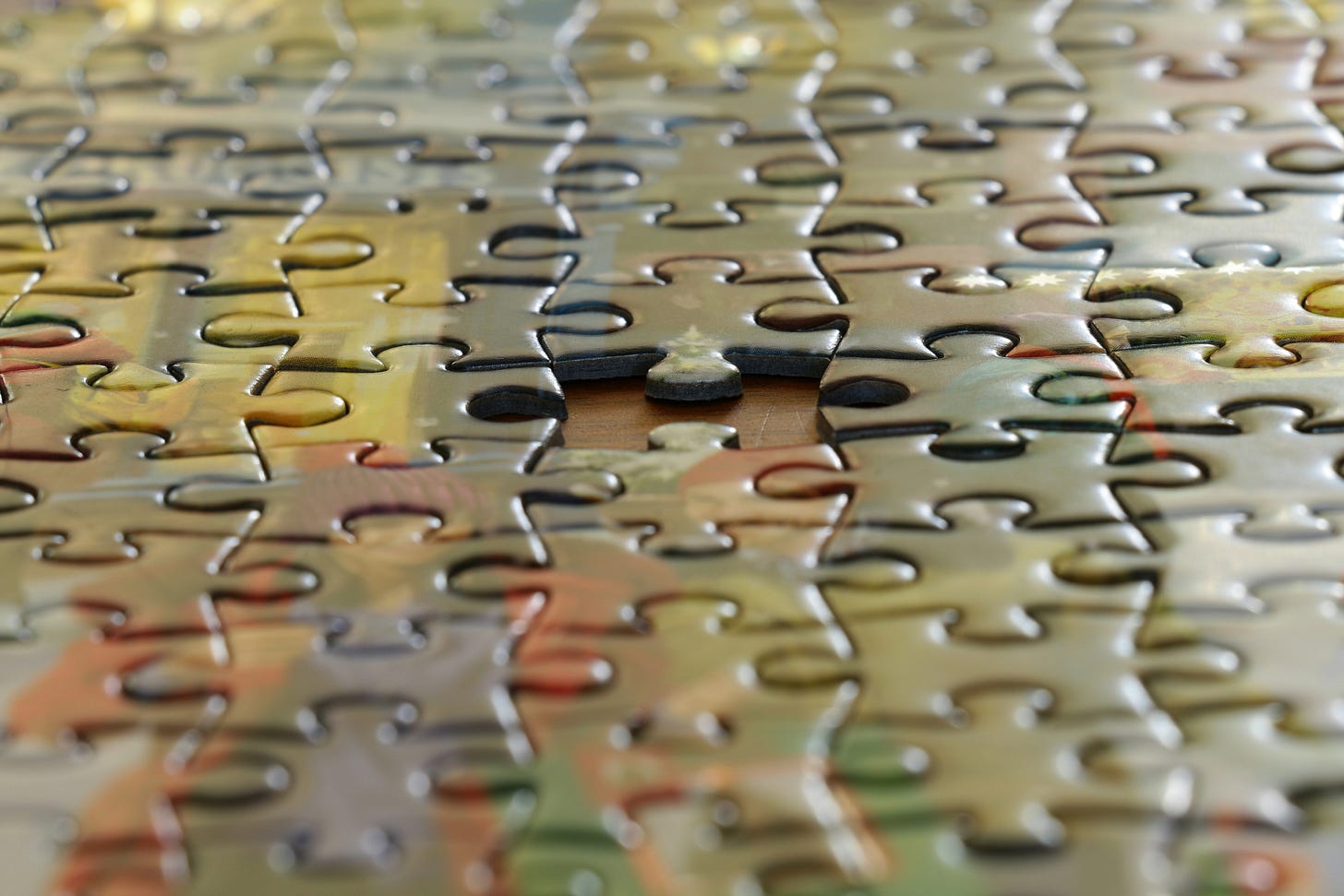Missing Pieces
Going to where the spaces are.

Donald Rumsfeld made the idea of “unknown unknowns” famous in his briefing on the war in Iraq, but as so often, he benefited from being visible rather than clever. The original idea more likely belonged to Frank Knight in his 1921 book Risk, Uncertainty, and Profit for distinguishing between measurable risks (“known unknowns”) and true uncertainty (“unknown unknowns”).
Within the limited bounds of its scope - data - and its inevitably Western take on it, AI looks likely to merge much of our known unknowns and unknown knowns.
When all the data we use can be parsed, filtered and sorted, there will be few places for the unknowns in the body of data we have to hide. AI might even shine a light into unknown unknowns, revealing things in the data that we didn’t know we didn’t know. But data has boundaries, otherwise we wouldn’t have to describe so much of the universe in terms of dark matter and energy.
I think AI faces a “dark data” challenge. It can describe feeling to us but can’t feel. Neither can it smell - it can analyse odours but not derive joy from the unmistakable early morning smell of Spring.
We have learned to revel in what we have discovered and what we can do with it, with some justification, but I’m not sure we were created to be some sort of organic processor. We are created curious, and despite our education system's best efforts and economic models' needs, we are not created to consume.
When it comes to missing pieces, we will always be one step further ahead than any technology we create. If we handle it intelligently, recognise and leverage our individual and collective uniqueness as humans in the world, AI will be a huge benefit. If we do not and choose to define ourselves in terms of our ability to consume rather than wonder, then humans, we have a problem.
If we continue to define our potential in terms of our ability to parse and regurgitate what is known and offer first-class degrees for achieving a paltry seventy per cent pass mark, then we deserve to have our lunch eaten by technology.
John Boyd had a mantra - “people, ideas, things - in that order”. We have forgotten that - things have found their way to dominance, from artefacts to organisations, and we operate our economies based on assigning them scarcity.
“Opposites are not to be resolved by eliminating the one we happen to dislike, any more than lopping off the south end of a bar magnet gets rid of the south pole: it just shortens the magnet.”
Iain McGilchrist, The Matter With Things: Our Brains, Our Delusions and the Unmaking of the World
We have allowed things we have created to take precedence over those who conceived and articulated the ideas that brought them about. We expend our energy competing for a tiny part of what we have the potential to bring about.
We are supposed to be the most intelligent form of life, yet we disguise it rather well.
We have created technology that can wring every ounce of benefit out of what we know - even the things we don’t know hidden within it. We are using it to remove the qualities of the human that brought it about without really understanding the importance of the things we cannot measure. Relationships, imagination, enthusiasm, beliefs and all the other aspects create the glue that holds the processes of work together.
The more we use technology to remove humans from process, the more fragile the ecosystem that the work serves becomes. The cracks appear gradually, then suddenly.
Artisans can see the cracks early and have the skills and connections to fix them before they cause real damage. They also have the skills and capabilities to replace what is broken when it cannot be fixed.
As work changes, our task is to go where the cracks appear.


This is a profound and timely piece, Richard. I wonder if we have become so used to being hemmed in by hurry and noise that we have become a little afraid of space. Yet that is what we crave as human beings. Otherwise, we settle for becoming human doings alone and struggle to connect with each other and the ideas and perspectives each might carry.
Perhaps we DO exist in duality afterall